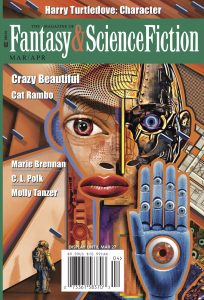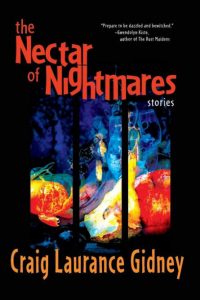Rich Horton Reviews Short Fiction: F&SF and Analog
The March-April issue of F&SF is a significant one, the first put together by new editor Sheree Renée Thomas. Based on the evidence in front of me, she’s got off to an outstanding start, though we need to wait a few issues before we begin to understand Thomas’s editorial vision.
The issue features a strong Madeleine Robins story, “Mannikin“, about a boy who is raised as a girl by his mother to save him from being conscripted into the army. Bire grows up believing herself a girl, especially once magic gives her a glamor that hides her male parts from everyone. But war still comes to her city, and Bire finds herself leading its defense, which by now is bereft of soldier-age men. The women Bire recruits organize a strong enough defense that the invader accepts a parley, and an alternate offer to avoid the coming sack. All should be well… except for a tricksy river god.
“In the Garden of Ibn-Ghazi” is a fine mysterious, horror-tinged piece by Molly Tanzer. The narrator is a writer who mentions having read a story with that name, in which an attempt is made to duplicate the powder from Lovecraft’s “The Dunwich Horror”, but no evidence of such a story can be found. Then an invitation comes from a man named Upton De Vries, to a performance of an obscure 17th-century play written by a French noblewoman, the Marquise de Sevigny. This performance will be at an obscure estate in Pennsylvania…. We are treated to a journey to this strange place, to the play, to a memoir by the rather rackety Marquise, and to an unexpected invitation not just to see the play but to act in it. Because we know this is Lovecraftian, we know that strange and sinister things will result, and so they do. The conclusion is a nice twist from what I thought at first.
Cat Rambo‘s “Crazy Beautiful” is about the investigation into an art project discussed over a chat forum…. It becomes clear that the art got quite strange, and that the people involved are all mysteriously dying in custody. Soon we realize an AI is involved… and the story becomes both about art, and why art might be important to an AI, and why an AI might see art differently than a human. It’s both scary and… “crazy beautiful.” Perhaps my favorite story from early in 2021.
There’s plenty more strong work in this issue, including Meg Elison‘s “The Pizza Boy“, which is about a boy in a distant, war-torn star system who makes pizza in his ship and delivers it to anyone who wants. The story rather neatly suggests how one might make pizza (and its ingredients) in such an environment – but it also has something to say about war and resistance. C.L. Polk‘s “The Music of the Siphorophenes” is a fun and interesting adventure in the outer Solar System, with a brave pilot and a pop star and a lonely alien battling space pirates. Robin Furth‘s “Jack in the Box” is stylish horror set in post-war Britain, in which a journalist working on a story about the death of a famous orthopedic surgeon uncovers something quite horrible about the old man – and about his bratty grandson.
In the January-February Analog I liked Benjamin C. Kinney‘s, “Conference of the Birds“. It’s a story about emergent AI, told from the point of view of several potential AIs, as a network of drones, charged with making sure criminals don’t get away with things like theft of medical services, responds to various stimuli (unexpected reactions by their targets, lack of human intervention, interruptions in network service) by adjusting their actions. Of course there are implied good guys and bad guys here… and surprises as well, and the open question remains “Where do AIs get their ethics from?”
I also liked a story from a writer new to me, Charles Q. Choi. “By the Will of the Gods” is set on a planet subject to frequent meteor showers, making space travel hazardous. Hap’s parents were killed when their ship was holed by a rock, and the local religion means that Hap is cursed as “starcrossed” – the gods must not have approved of his family. Eventually he is adopted by a temple devoted to “foretelling,” doing menial work; and his surrogate father becomes a gruff man named Harrow, who teaches him self-defense and uses him on certain strange errands. As the story opens, Harrow has been murdered and Hap seems the only person interested in learning who did it and why. That mystery isn’t the real point of the story, though…. What’s cool is what we learn about the politics of Hap’s city of Nightingale, and the bits and pieces we learn about the galactic milieu, numerous human-settled planets linked by wormhole gates, as well as what we learn of Harrow’s secrets and their implications for Hap’s future. I’d be glad to see more stories about Hap, and also stories set elsewhere in this future.
I should also mention a story from Norman Spinrad, who is now 80 years old and, with the death of James Gunn, must be nearly the oldest SF writer still writing (unless Michael Moorcock is still active, and noting that Robert Silverberg has retired from fiction writing). “Belles Lettres Ad Astra” is about a writer 100 years from now who is recruited by a crazy billionaire to write science fiction stories for the aliens in a Dyson Sphere 1,000 light years away… and who ends up heading in that direction on a starship. The theme is the value of science fiction and the urge to explore…. Curiously, much the same theme drives Adam-Troy Castro‘s very short story “The Last Science Fiction Story“!
Recommended Stories
“By the Will of the Gods”, Charles Q. Choi (Analog 1-2/21)
“The Pizza Boy”, Meg Elison (F&SF 3-4/21)
“Conference of the Birds”, Benjamin C. Kinney (Analog 1-2/21)
“Crazy Beautiful”, Cat Rambo (F&SF 3-4/21)
“Mannikin”, Madeleine Robins (F&SF 3-4/21)
“In the Garden of Ibn Ghazi”, Molly Tanzer (F&SF 3-4/21)
Rich Horton works for a major aerospace company in St. Louis MO. He has published over a dozen anthologies, including the yearly series The Year’s Best Science Fiction and Fantasy from Prime Books, and he is the Reprint Editor for Lightspeed Magazine. He contributes articles and reviews on SF and SF history to numerous publications.
This review and more like it in the March 2021 issue of Locus.
 While you are here, please take a moment to support Locus with a one-time or recurring donation. We rely on reader donations to keep the magazine and site going, and would like to keep the site paywall free, but WE NEED YOUR FINANCIAL SUPPORT to continue quality coverage of the science fiction and fantasy field.
While you are here, please take a moment to support Locus with a one-time or recurring donation. We rely on reader donations to keep the magazine and site going, and would like to keep the site paywall free, but WE NEED YOUR FINANCIAL SUPPORT to continue quality coverage of the science fiction and fantasy field.
©Locus Magazine. Copyrighted material may not be republished without permission of LSFF.



 F&SF
F&SF 





86 year old Piers Anthony is still prolific, with several novels in the works.
Another thought on Rich Horton Reviews: On this page, just above, in fact, Horton — who likely has as much access to the internet as the next Drongo — writes, “…if Michael Moorcock is still alive…” Class move, Horton.